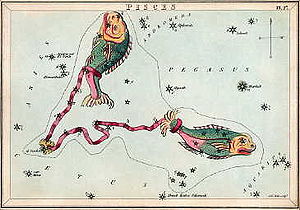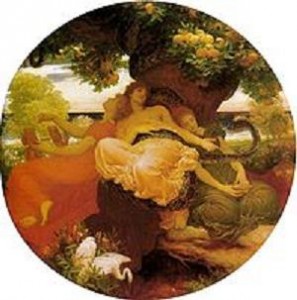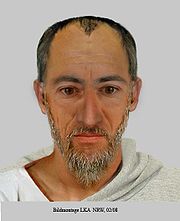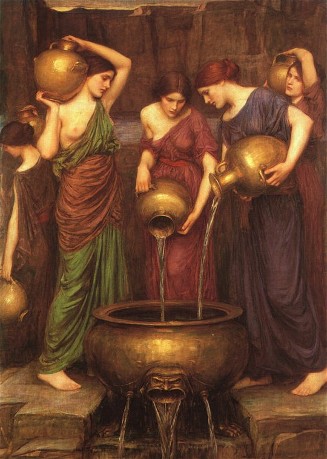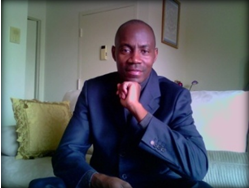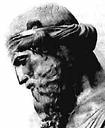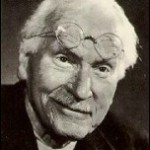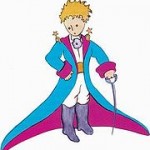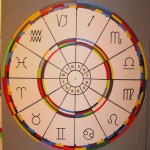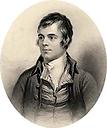Microcosm Lecture Series Notes
Transitioning Into The Aquarian Age
Lecture 7 of 25 by [R]
Symbolism and The Aquarian Age
The title of our talk tonight is called Symbolism and the Aquarian Age, and for a little while it’s going to sound something like church, talking about things from a Christian perspective.
In the first chapter of Romans that is attributed to St. Paul, but we don’t know for certain, St. Paul made quite a remarkable statement, saying, “We all beheld the now invisible glories of God even unto the God Head. But by sin and vanity we all degraded ourselves to darkened ignorance and coarse beings.”
` We all beheld the invisible glories of God even unto the God-Head. Now that’s quite an outstanding statement, but it is a statement that has been corroborated by other seers or mystics, Max Handel included. This is to say that at one time we all had spiritual vision of a very high order. Now this seems almost incredible and it seems so obvious that we would do something that would destroy our capacity to see the spiritual worlds. It says we chose darkness over light. Now we certainly wouldn’t make that choice with our present consciousness and we certainly wouldn’t make that choice if we knew what came out of it. So there must have been something subtle in the whole matter. It’s always more subtle especially when we’re talking about who helped us get into the jam that we are in now.
According to the ……… the Lucifer Spirits, who at one time were the highest of all the angels, persuaded us to take the creative energy into our own hands, promising us immortality – immortality through procreation. They offered it to us as an autonomous freedom. That was the selling point, and they really did fulfill their promises. They gave us some very good things. First of all when our eyes were opened (which means that we developed perception of this outer material world) the whole without was available to us, which had never before been available to us throughout our entire evolution. We could see the whole external world and we could experience it directly.
Now everything that we were told was true. It was true in ways that even the Lucifers could not foresee. Now, a good deal of the fix that we are in at this time is not due to what they told us but to what they didn’t tell us. When we fell, according to the biblical story of the Fall (there are others and they all pretty much agree with each other), it is what they didn’t tell us and how they told us what they did tell us. The problem was not that we took the creative energy, which is also the procreative energy that is used physically. It wasn’t that we took that into our own hands. It is that we took the creative energy into our own hands at the wrong time. And we didn’t know how to use it. We didn’t know why to use it, or when to use it. So we are told, for example, in the Rosicrucian Cosmo-Conception that we took control of creativity before we knew how to use it in terms of harmony with the rest of the cosmos. So, what we did was introduce adharmony into the whole creation.
This is one of the options available to us. We are free to go against the whole process if we want to. Because ………. a stupid thing to do that we can do that. And part of the reason—certainly not all of it—was that we took the full creative …………into our own hands for very selfish sensual reasons, and this is what St. Paul means when he’s talking about vanity. So we can see that one of the big problems was ignorance about the matter of time. Now, in the spiritual worlds anytime you journey inward you learn that time is a very different thing. Even at that, the understanding of time in the inner way is not really clear and easy. At the time of what is called “the fall” we did not have much capacity; we do not now have the capacity. We did not understand logical sequence and we could not make connections about cause and effect or about cause and consequence; of reactions to our deeds.
This is symbolized in the biblical story, saying that we hadn’t long enough eaten from the tree of knowledge of good and evil. When we did this and we took creative actions that we could not foresee the consequences of, and that we did not know how to deal with, the consequences were that we produced an imbalance. And that same imbalance is present with us to this day. Many people know, (not all of us, but the majority) that many people produce more and more problems for themselves than they could possibly redeem within one lifetime. And as far as the consequence, all of us over many rebirths have what is called in Christianity a burden of sin. We have a lot of unredeemed or harmful things or selfish things that ……… and we have never been able to liquidate them. Now the imbalance was something different than that. It was self-perpetuating and it continued to make things worse. When we chose to use the creative force to excess, downwardly and outwardly, we directed our attention more into the material worlds and away from the Spirit.
The consequence of this imbalance was that we did not have insight working harmoniously with experience. It is all right to make mistakes, for if we learn from those mistakes and have intuitive insights into what those mistakes mean, we grow. But when we have become so preoccupied with sensation and material living, we take the experience but we neglect the insight. And as a consequence we make the same dumb mistakes again and again and again. I am willing to believe that everyone in the room has had the experience of doing something stupid and doing it again and again and again, because we don’t have the insight to understand that that’s what it is. We make mistakes and don’t even know that we make the mistakes. Now in the story of “the fall” as it is told in the Bible, we are seeing that in our eating of the tree of good and evil the big sin was disobedience against Jehovah.
Now that’s a little bit hard for me to swallow because I am a child of fire, and not a child of water, and I don’t believe obedience is the be all and end all; it’s probably one factor. When Paul uses the word vanity it helps to understand this. It intimates that selfishness (which is another name for vanity) and not merely the use of the sexual energy was the problem. It was that it was used selfishly. And when it was used selfishly this egoism that resulted from it changed our perception or our, how do say it, our viewpoint of the whole cosmos. Previous to this when we were inward our consciousness was more universal. We were part of the general unity of all humanity. And we were unconscious altruists. But when we changed perspective from altruism to the individual we changed the entire outlook.
Our perspective became subjective and it became a “now it’s me against the world” kind of thing; we lost that universal understanding of things that had previously been ours. So this produced an inversion; we saw things backwards. We saw things, not in terms of the purpose for all of humanity, but we saw things from only our own point of view.
Since then, over many thousands and thousands of years, the inversion became more complete, so that now people, in their vanity, think that they are equal to God—and those kinds of inversions. The Rosicrucian Philosophy, like other modern Western philosophies, claims that the fall of humanity was not a complete disaster and that some very fine things can come out of it, things that were not planned for in our evolution. They can come out of it if we take advantage of them.
When we were cast out of the Garden of Eden that’s another way of saying that we lost our inner vision. We used to be able to see as the statement of St. Paul says, “…right to the very Godhead.” We closed that off, and now we see only from our own selfish point of view and we see only outwardly into the material world. Some philosophers have called that an isolation, or a quarantine, or an exile from Heaven into a world of bare matter. But in this world we actually do have freedom, a very special freedom. We didn’t do our creative life experiments—we can live our lives the way we want to live them without being led around willy-nilly by the divine spiritual hierarchies. You know, there’s nobody that we can see commanding us to do things whether we want to do them or not. We have that kind of freedom. We can even sin if we want to sin, and we can work (ad-harmoniously) if we want to and it seems that we are almost prone to it. It’s almost as if we had developed the habit of not working in harmony. So we can see that we’re going to learn. From the knowledge of good and evil we know about cause and consequence, and we know that everything we do is going to have retributive reaction to it, and through that we learn. We learn the nature of the law from the outside. We can look at it as objectively as we now look at law in physical law in the sciences. That’s one of the benefits about all of this. There are many other benefits to our fall from grace. This would take a whole series of lectures to talk about them and that’s not our purpose. We’re only going to look at one of the consequences of the fall into materialism. And we’re going to look at it as it pertains to the Aquarian Age. That problem is a problem of illusion and repression. In this series of talks this is the talk that relates Pisces to Aquarius. Therefore we are finally done with the first introduction… this whole talk is mostly introductions. By the end of the night we’ll actually say something. Let’s start by telling part of a story—a story that is not a Bible story but is parallel to it. And if we get into the charming world of pagan mythology it gets me out of sounding too much like the preacher, because if I continued I’d be pounding my fist into my hand and we certainly don’t want that. Yea, one amen and I’m out the door. I have nothing against that way of approaching spirituality but it’s just not me. In Greek mythology there was a place called the Garden of the Hesperides.
The tree was guarded not only by the Hesperides but there were other guards. First of all there was the thousand-eyed who kept all the eyes…. one of the eyes was open at least all the time. And the other guard of the tree was called Leper, a dragon who wrapped himself around the base of the tree and never let anyone approach even though he slept under the tree. In the tree there were other creatures that slept; most notably there were bears that slept in the tree. And in this tree there were Aphrodite’s’ apples of the light (life), which were an invaluable prize. If you ate them you’d have eternal life as long as you were eating the apples of Aphrodite.
This is a (seriously) different story from the Adam and Eve story but it is parallel. Now obviously it is the same story because when we’re in the external world all of our senses used to be called the five senses of touch. And we’re talking here about an externalization of consciousness and the Hesperidins represent an innocent sense of touch–you know everything in the external world. The tree was probably the electromagnetic field of the earth, because if you have etheric vision and you’re standing near the North Pole you can see the energy of the whole earth that comes out like a big trunk, an immense trunk, and it spreads out like a tree—as in magnetic fields that you probably studied in your high school and maybe in your junior grade school.
In one point of view it is the Bhodi tree where Buddha put his statue when he had his enlightenment. And from another point of view it is probably the world tree that Christ Jesus was crucified on. The Dragon is the constellation of Draco which used to wind around the North Pole; and the bears that sleep in the tree, if you would look through the light energy of the North Pole you would see the constellations of Versa Major and Versa Minor which are the great and small bears. The eyes of Argos are the stars themselves which are at the same time the apples of Aphrodite. The light (life) not only comes from our Sun but from every other star. It says the stars are pinholes into the spiritual worlds that are worlds of light and of creative love.
Richard Wagner in his Ring Cycle had a similar story only they were called the Apples of Freya as they are in Norse mythology. And he has it happen right in the first …..of the ring Cycle that after the gods have built a new kingdom for Woton he wants to welch on the bet. And the bet is on the deal. And the deal is that …. Gee do you know what I just did? I just used a racial epithet called welching It’s in the language and it’s so much that you don’t realize it sometimes. But the deal was that they would get Freya and her Golden Apples for building the new palace for Woton. He did not want to pay up. So they said they would settle for the gold of the Neibelungens instead. And he didn’t want to give up the gold of the Neibelungens either. So he had to give them Freya because of the contract that he had to give them Freya and when they took her away the Gods were no longer eating the apples of life and they all started to wither away right on the opera stage, and to see a huge big opera star wither away is quite something. After the light effects, if you’ve ever seen the opera they all turn grey is the way it is. So you can see that this tree which is a Tree of Life—it’s in Norse mythology, it’s in Greek mythology, and it’s in Hebrew mythology from the Old Testament.
If we go back to Genesis we see that in the middle of the Garden of Eden was also the tree of life. So there were two trees or one tree by two different names. There was the tree of knowledge and there was the tree of life. And in the same way that the tree of life was guarded by the Hesperides and the dragon and everything else the tree of life in the Garden of Eden was guarded by various spiritual beings who kept us from eating of its fruit. Because if that were the case we could perpetuate bodies even very imperfect bodies like we have now. And we would be mortally ill or something like that. So what we’re talking about here is about how these stories relate to our life in this world, because we don’t have much life in this world. Our life here is rather dead; this world is moribund compared to the inner spiritual worlds. Even the Sun, which is the really big apple that is our primary source of light and life, is only available on a part-time basis. And the light that comes from the Sun has to be translated to us by the plant kingdom. Or we don’t get the life.
The images don’t match perfectly but in this world we’re something like desert plants. We have brought ourselves to a state of evolution where there is little of the water of life. And we spend so much time holding onto that little bit that we do have, there is little left for any growth. It is kind of ironic because we took the power of creation into our own hands so that we would have immortality and immortal life. And the consequence of it was because of the way we did it we ended up with very little life and too much matter. Our lives are repressed. We finally got to one of the words that the talk is about.
Our lives are repressed by the weight of materialism. The spirit is encased in material repression. And we have made our solitary confinement. In this world we’ve turned it into something like cruel and inhuman treatment. The life that we need is more than just sunshine, it is a vital life, so that we can really live. It’s like a water of life. We also need feelings—emotions that motivate us—especially the higher kinds of feelings. So we need the water of feeling. We also need truth in the form of thoughts because that’s the way we generally apperceive truth. So we need the water of truth. So when we’re talking about this water that has been specialized in such a way that we can use it, we’re talking about the apple.
And so the apple of apples is of vitality and of emotion and of truth and intuition all at the same time. They are vehicles or vessels of those things for our development. They are something like libido. Therefore, the stories of eating the apple are associated to sexuality and libido which carries emotions and thoughts and everything else that’s part of this being—as is concentrated in spinal fire, which is what we are talking about—our personal private tree of life and our personal private tree of knowledge. We’re talking about libido. Now probably the most important vehicle for bringing this life and light and wisdom to us has been symbolism. And so we finally got the topic of the night: symbolism. Symbolism is well suited to bringing inner spiritual world of life and light to us. Myths and stories: our lives. So they carry life. We just saw that all of these stories spring to life quite easily. Symbols have morals built right into them. All of the stories have them, and they satisfy our psychological needs. So the symbols are very important in that way. And they have that special way of conveying the spiritual worlds into this material world in a way that we long for and you know almost any child, in fact any adult who longs for those stories, because there is something of that other world that leads us to where we want to be spiritually, and where we are lost from because of the preoccupation with matter.
Symbols are flexible and ambiguous enough so that they have many different sides and interpretations. And so all of the different nuances in truth into the spiritual worlds can (not all of them, but quite a few of them) be carried through symbols. Symbols are capable of variation. They can be molded into a fabric so that you have an entire mythos. And, they can be adapted to different people at different times. They point to moral growth and they point to evolutionary objectives, which is why the stories were given to us in the first place—so that we would have the moral guidance and so we could see for ourselves through experience.
Myths change and times change. People change and their myths change with them. We’re talking about symbols and how flexible they are. Now there are many different kinds of symbols. Some things are made into symbols that are not symbols in their basic being. Trees: we can look at the tree or carve our initials on it, you know, ‘John loves Mary.’ That tree then becomes a symbol of something more than just a tree for what it is in itself. Even nature forces like fire and water have a symbolic character that goes beyond just their physical nature. And we can even take some things and we can superimpose symbols upon them whether it is good for them or not. We do this a lot with our pets. We say here’s a good doggie, and there isn’t a dog knows whether the hug is good compared to any other, and we project all kinds of things on our dogs and we neurotify them. Unlike cats they’re not so easily neurotified. And like most our age ………cat before the dog people………….
Sometimes symbols are very abstract, very artificial. We have geometric figures and numbers that stand for relationships that can only be seen with the invisible eye—with the inner eye. They can’t really be seen physically. Sometimes we need to be disrupted from our materialistic pragmatism. We take things for granted here, and we are presented with symbols that are incongruous. 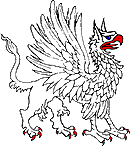 For example in mythology we have griffons and sphinxes and all kinds of animals that are incongruent. They don’t fit together right. And if you’re interpreting your dream and you are trying to get to the most meaningful part of the dream, look at the part that’s the oddest. You know, all those impossible things happen, so symbols, by being incongruent, can bring us right to the point where we are to direct our consciousness.
For example in mythology we have griffons and sphinxes and all kinds of animals that are incongruent. They don’t fit together right. And if you’re interpreting your dream and you are trying to get to the most meaningful part of the dream, look at the part that’s the oddest. You know, all those impossible things happen, so symbols, by being incongruent, can bring us right to the point where we are to direct our consciousness.
Again, sometimes symbolic elements are woven together and we have a whole grand mythical world around us. We just saw a piece of that grand mythical world when we talked about the garden of the Hesperides. Then there are also symbols that are compounded to other symbols. And the most complex of all these symbols are called mandalas. Mandalas arise in cultures from all over the world. We are treated in this city; every now and then the Buddhist monks make sand mandalas, which are beautiful. They’re brilliant in color and they have all of these details to them. And if you choose to sit next to Ela in this class you get treated to a partial mandala every time there’s a lecture, because she makes drawings in classes according to what’s going through the psyche.
The word mandala comes from primitive people. Primitive people, when they needed to dance without the use of any instruments, would form themselves into a perfect circle and they would dance in that perfect circle round and round until they had worn away all the vegetation, until it was just earth there. It’s truly interesting because one of the most advanced forms of dance is modern Eurhythmy by Rudolph Steiner’s wife. All of my friends who have gone through Eurhythmy school find that the first thing that the class does together as a class is find the ability to make a circle. It’s as if the circle, the symbol of spiritual perfection, is universal in any kind of expression.
One of the grandest mandalas of all is the astrological mandala. In it all of the constellations are lined up or called the signs, and all of the signs are lined up with all of the houses, and all of the planets are in their signs and houses of rulership, and the aspects are implicit within it. It is the ideal universe. Just about everything that is in the external universe is in the symbolic universe of the mandala, which means a lot of good thinking. For example, the battle of the sexes is built right into the mandala. If you look at the toilet doors in a lot of establishments men have the Mars symbol and Venus is the symbol for the women. And the martial signs are always opposite the Venusian signs. So you have this built right into the mandala and you have that kind of sexual differentiation.
You have the relationship, for example, of immediate experience in a triangular relationship leading to education. Education, on the other hand, leads to higher purpose philosophy or the understanding of things. And from higher purpose you are brought to new fresh experience. So, all of these things are really built into it. The ninth House, for example, is the house of theory. It’s at a 90 degree angle from the 6th House which is the house of practice. So, theory and practice are in a constant struggle in humanity and this is symbolized right within the astrological mandala.
Now in this whole series of talks, that are going to be about 25 talks, we are looking at each of the Signs of the Zodiac relative to Aquarius. To that we’re trying to look at problems that relate to the Aquarian Age. We are using the mandala for that purpose. The second talk, which was the flagship talk, was called The Holy Grail and the Aquarian Age in Heaven and Earth. We noted that when you go around the astrological mandala there are two directions that you can go. When you go forward, as the planets seem to go forward, what you’re looking at is a symbolic direction of time in which things go forward. We can look at Heracles through the forward projection of the Zodiac. The other way that we can look at them is by when things go backwards like the precession of the equinoxes. That is what we have been doing. The ……… is now about here in the constellation of Pisces and it’s working its way toward Aquarius, which is the Aquarian Age. So we see on the mandala when you look at precession you are looking at consciousness of humanity historically. (In the background of the cosmos it’s being directed toward Aquarius). This can be looked at in a number of different levels, but we don’t want to get too far into that because we could go too far a-field and go to pot and the talk would end very quickly. What we’re doing is looking at the mandala’s a very difficult thing. It’s difficult enough to look at reality and see how everything is connected to everything else. It’s difficult to look at the mandala and see how everything is connected together in the mandala and then try to pass from one to the other with intellectual understanding.
This is a seemingly difficult thing to do and it’s not something that everyone wants to do. I don’t think that even in theoretical astrology, looking at it now is for everyone. Some people are suited for it and some people are not. When we look at the mandala it is basically a circle which brings us to that perfect circle of very primitive people dancing in a circle. The one reality of all the mandala’s is unity. What we live in is a universe. It’s all one. It’s all within that one circle—the center is everywhere and the circumference that is nowhere. There is a maxim that talks about spiritual circumference and unity. The more that we can look at it in our consciousness the better it is because it removes a lot of superstitions and misunderstandings and it causes us to be open so that we can see how all things relate to other things. That maxim is “everything is in everything.” Very simple, everything is in everything.
In the same way that the spiritual worlds interpenetrate this gross material world, everything is interpenetrated by the One. Anything that happens on one plane is within the One. And so it affects every other plane, because everything is in everything. That’s another way of looking at the use of the words. Everything, the All, is in everything. And so everything is then connected in that way.
So if the astrological mandala is to be a symbol or representation of that entire universe, it has to be like that, and even in its most simple astrological makeup it is. We can’t know something about the Signs without the same kind of knowing something about the Planets. And we can’t know something about the Planets without knowing something about the Constellations or the Houses, or the Aspects, because everything is tied together.
When we sat two weeks ago we talked about the 180-degree relationship, the opposition. We talked about the fulfillment of altruism through individual love with Leo and a few other things at the same time. Before that we talked about the 150-degree relationship which is sometimes called the quincunx. We showed how the esotericism of the Pisces/Virgo Age becomes the exotericism of Aquarius, and how the exotericism with the Piscean Age becomes esotericism in the Age of Aquarius and Leo. That aspect showed how things pass from “the within” to “the without” and from “the without” back into “the within.” This is a very abstract kind of thing. In this talk and in the next talk we’re going to talk about the complement to the 150-degree aspect, which is the 30-degree relationship. It’s called the semi-sextile Now, in rosy Rosicrucian Philosophy we talk about the life cycle from rebirth until we are reborn again. And we know that at the height of that life cycle, when we are most our Self with a capital S when we are divine beings and all of our experience and all of the seeds of all of our vehicles of experience are one and we are one with the universe, we get the big picture. We see for ourselves the divine plan, the purpose of it all. And we are filled with inspiration. When we are filled with inspiration we become divine beings. And divine beings give.
So, we want to give, and because we want to give we come back to rebirth. That giving-out attracts to us the matter of the various planes until we come back to this world and are born in this physical point. When we’re inspired to come back, our whole life is set spinning. And everything spins forward. As we spin forward we go deeper and deeper into matter. As long as we’re looking forward in life (light) we become more material. In fact, as we continue that route in life, we become more stony the older that we become, until we cannot sustain the will to live. (The creative inspiration that set us going on this whole cycle) and we let go. And when we let go everything unwinds. All of the matter is taken back into the spirit. So what we are talking about here is about the whole life cycle.
If we start and we say birth is at the Ascendant, when we get to the cusp of Cancer wherein Cancer rules the womb, and that is when we come to the materialized manifestation of the physical world and we continue forward. We continue forward until we meet the limit of our capacity to move forward and then we let go. And then things unwind. We reflect and we look back and we assimilate. This is the cycle that we do again and again and again. This same cycle, if we put the Sun and the Moon on the Ascendant, we can follow
..………… the Lunation cycle that we have every month in the heavens and we can understand the cycle of cycles relative to seeing what happens or what unfolds month by month in our lives. In this cycle, as it is on the mandala, the Cusps represent significant points. …………It is the beginning of things. It is the now. It is the birth. When you come to the first Cusp forward, that represents a change of state. But when it is all at the moment of birth it is all very exciting. It is all very projective. You are going forward, and you meet the second house cusp and there is a basic change of state. And that basic change of state is called consolidation. Taurus represents ………means making things dense, it means bringing things to a state of …………… At the end of the cycle, when we have basically given up everything and we have dissolved everything, there is a change of state at the last cusp. And that is called collapse. So the two basic changes of state are consolidation and collapse.
And these work very well when you are looking at two planets in the semi-sextile relationship. This is called first semi-sextile ……..is called a second semi-sextile. I don’t want to go into that too much because it would take us too far away again. This rendition of things that we are talking about now is relative to manifestation in form, in matter, in space. We are looking at time. We are looking at the other potential. We are interested in changes of consciousness that happen in history. And so the Cusps which we are looking backward in the …………..have different meanings. So that what happens from the past is what pushes us forward. What happens from the future or that comes to us from the future is what pulls us forward. In some cases we are forced to make changes from the past. In some cases we are pulled forward by the possibilities of the future. So the two ……… when you look at them in terms of the………represent push and pull. Relative to the Age of Aquarius the push comes from the Age of Pisces and the pull comes from Capricorn. Capricorn likes to have pull anyway, that’s its basic nature. In this talk when we finally get to it…….(laughing. …………) What we finally get to in this talk is we will talk of Pisces. The next time we meet in two weeks it will be the talk associated with Capricorn. 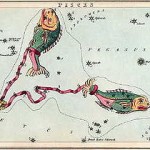
Pisces rules the feet. And evolution is another name for growing up. If we put the two of them together we have a very simple basic understanding of what the push is like. I grew up in a relatively poor family. I knew what it was to have tight shoes. It means that pressure of going forward… the pushing forward was repressed by the shoes that were getting too small. That power to move forward from the past, that kind of life is the push that we’re talking about when we’re talking about the Age of Pisces relative to the Age of Aquarius. Pisces rules the shoes. So the materialism that holds things in so that they do not go, they don’t come to light. It’s like Pisces also. In fact, in cosmographical astrology Pisces represents the dense physical plane. We are in our Twelfth House Pisces imprisonment. And our consciousness is almost exclusively focused in the material plane. Because of this preoccupation with matter our [lessons] with the spiritual worlds has been through symbolism. Symbolism is a stop-gap that means to make up for our tradition of having fallen into matter. The funny thing is that some people want to be imprisoned. We refer to them as lifers. And they content themselves with what they can see through the chinks in the wall or what they can see on the television screen. Materialistically (or materialist analytical psychologists) we do not believe we can have waking consciousness in the spiritual worlds. They call the spiritual worlds the unconscious. And so they are like the prisoners who are content with being in prison. To them symbolism is the ideal vehicle to reach the unconscious. It is sort of like the television screen that says what is going on in the outer world. For such a psychologist, symbolism is the language of the soul because it lends itself to imagination, to thought and association, and intuition and so on. It is simultaneously stable; it is permanent; it is an object; it is a material thing. It is delineated that way. But at the same time it is flexible, as we said a few minutes ago.
In fact, if we look at the artifacts of humanity that have been ……… we have a history in solid forms of the history of the consciousness of humanity. If we probe and analyze with psyche the choice of symbols that we have are important. They indicate what is going on. They are like the symbols that are in the dream. So it is easy to see from all of this why a psychotherapist of this type loves symbols and they love symbolism. And it is something that is very valuable, because it gives you something definite to focus upon.
However, this kind of psychology or psychotherapy was born in materialism. And whether we like it or not the symbols are material; they are objects; they are things. We have been used to materialism so long that we have gotten into the habit of thinking that materialism is the reality. We think that everything comes out of matter. I am not trying to put down materialism. I am not putting down analytical psychology that is basic in materialism. The only thing I am trying to do is contrast it with spiritual development. Because spiritual development is ……… And it does away with the symbol and goes to what we normally get from the other side of the symbol.
You perceive (can see) or this is like being released from prison. You are no longer looking for just the little chinks in the wall, you are on the other side. But even for us as mystical aspirants, symbolism can be helpful. Analytical psychology can be helpful. I have benefited a lot from it and I continue to read in it and think in it. It is a very valuable thing. But there has to be a realization that it is not enough in itself. Alone it is not enough. You can do it without analytical psychology. We have, for example, from the ………….. In the first volume we have the stories or the histories of the desert monks who just had it out with themselves and all of the demons of their own thinking and they directly went at it until they made a breakthrough and had direct spiritual experiences on the other side.
They did not have any psychology. They talked about the sex demon being, and the food demon being and all that, and they literally could see them because they were objectifications of their own consciousness externally. But they did it without any psychology. When you are trying to grow spiritually symbolism and analytic psychology can be a great adjunct to that process. You can have tools that give some intellectual understanding of the workings of the psyche even before you enter it. But you cannot do it by psychology alone because these occupations with psychology in itself are stuck in the mechanism and you are not getting to the spiritual reality of it. It is like trying to see through water and constantly stirring up the water with the stick that you are trying to see through. It is that kind of impossibility.
Some materialistic symbolists, such as Carl Jung, benefited inner lives by using symbolism. But it also deterred them at the same time. Carl Jung had great problems in seeing spiritual reality because he was bound and determined to make Analytical Psychology a material science like all of the other material sciences. He has this marvelous book that has one major flaw that contaminates the whole thing. It is the book on synchronicity. He talks about how things happen in parallel in all the different worlds, but he says there is no vehicle that passes through all of these different worlds, because if there were there would be magic, and we all know there is no magic.
I did not know that there is not any magic. The fact of it is that there is. Now he eschewed the mysticism because he was trying to establish Analytical Psychology. (But probably if he psychoanalyzed himself deeply he could see that there was perhaps a reason to that.) Because he was not like the desert monks and he probably would have had to change his thoughts and sacrifice a lot of his personal things that were his own idols that we all have to do. If he had become a mystic, mystics do have a high regard for symbolism. Max Heindel who founded the Rosicrucian Fellowship did. But the symbolism was all for other things. We use it to understand other things that we cannot get to otherwise.
But it is not completely for that. Our intent is full waking consciousness in the spiritual worlds. That cannot be attained symbolically, because the symbol is something material and it is by its very nature limiting, and by its nature what would come though. The hierophants of the ancient mystery schools knew this. They had a very wise statement. A symbol conceals as much as it reveals. A symbol conceals as much as it reveals.
Symbols are filters as much as they are lenses. It is that filtration that is irksome to us if we want the whole truth. In turning now to the principle of push from the past we now have to look deeper at how we come to Aquarian freedom. In the quickness of spiritual intuition or even in the thought process, we can see that change in the material world comes exceedingly slow. It comes as slow as evolution seems to go. Or that geology seems to change. Now that is good for developing the patience and patience is a big part of it. But it is not good for the sense of emergency.
Against impulses we have to run the race. And the more we become attuned to our spiritual nature the more vital and vibrant it becomes and the more it becomes crucial. It becomes important; it is an emergency that we make the changes. Our selfishness and our self-centeredness blinds us as much as materialism does. So we have to learn the lessons over, again and again. We are enslaved by all of the material things, because it takes much more time to correct a mistake than if you had done it slowly, not made the mistake in the first place.
Materialism blindness also creates impedimental illusions. The material world is not an illusion as some think. But some of our views about it are. Our views are formed in matter and not in the wisdom behind the matter. So the very slow changing of things we see is like the solids, like rock. Rock solid is the word that we use, it never seems to change. In our insecurity we cling to constancy, to these material things.
We have insecurity because we are away from the spirit. If we were completely spiritual we would not have any insecurity. And so we cling to the very things that are repressing our spirituality. We, like the prisoners, want to stay in the prison. And we are even like horses. Horses: if the stable starts burning, you have to take the horses out of the stable and you have to hold onto them. Because they will run right back into the stable; that is where they have their security. So in our slowness we have a lot of unredeemed actions. And relative to the emergency of spiritual growth it seems like we are falling behind all the time. The burden of sin seems heavier and heavier.
Now there is either one way of looking at repression or in Christian mysticism there are different ways of looking at it. There is one way that mystics and materialistic analytical psychologists agree about the nature of repression. And that is that the stuff of what is repressed we call the unconscious or we call it the spiritual worlds and it is alive. It is unredeemed thoughts, desires, things that may have happened many years ago. If you bring them to the surface of consciousness they are as alive as the moment in which they were created. I have never spoken with a psychologist that did not marvel at this. Because it just happens; wham (!) it’s just so alive. People can relive experiences that happened decades ago just as though they were there again.
I have spoken on the matter that thoughts are things, not only just things, but living things. They are very vivid and they have a living power to do things. Thoughts and desires have very long-lived potency, and we have had a general accumulation of power from our experience. Just from the experience alone we have soul power and we have accumulated a lot of thoughts along the way so that there is a lot of information that is repressed content inside of us. The more something is repressed the more potency it has.
The longer we continue with our materialism, the longer we increase the potency and the creativity of what happens inside of us. The ironic thing is that the materialism that denied the spiritual worlds by its repressive qualities actually makes the manifestation of the material worlds possible. There is a lovely poet by the name of David Whyte who talks about this process inwardly. He talks about repressed images that get pushed down and down almost like geological strata until they become very potent.
And then they come up as something new. Manifestations of them become highly creative. It’s what is happening inside of our selves. Sometimes they burst out and we cannot control them anymore even if we want to.
I remember at one time living at a retreat center where there was a lady who all of her life worked three jobs. She was a very deep spiritual seeker and was very conscientious about it, and then she decided to retire. Huge mistake. When she decided to retire she was not thinking about the amount of energy she expended in all of the work that she was doing. Suddenly everything just burst out and she went completely crazy; very erratic behavior. But things do not have to burst out. Some people believe that symbols are a gateway for repressed content, and they certainly can do that.
But they are limiting. What happens is that we create new symbols for our conditions, but we have just extended the repression in a different way. In the pictorial Zodiac there are the tails of two fishes. And the two fishes are tied together. They restrain each other. It’s not surprising to consider this a symbol of repression. In fact Carl Jung is aware of that and even as a materialist he saw that the fish coming to the surface were looking for clear air and that is what the transition from the Age of Pisces to the Age of Aquarius is all about—even though he [Carl Jung] perpetuated the Age of Pisces. You really cannot be hard on him because he did such wonderful things.
But we cannot continue to live under the burden of sin. We cannot continue to live under the superstition of materialism. We cannot deny and repress what is within us. We are told that the secrets that have been from the foundation of time will be shouted from the rooftops. And they must be aired, they must be shouted. We cannot continue to maintain materialism and other illusions even though they might be very secure.
The whale of the Leviathan is also in Pisces, and it is going to surface. When it does it is going to surface with great power. The transition from being locked in materialism to waking up is going to be a burst. It is going to be a burst of relief, like Aquarian release that makes minor human sublimation seem like child’s play. If we persist in our inner work we will have the ability to transmute this energy and do a lot of good for the entire creation as well as ourselves. If we do not persist in our inner work–those who do not persist in their inner work or those who use inner work to gain control for themselves there will probably be insanity.
We already have a third of humanity in the United States – a third of the people are depressed. We are talking about the stuff of spiritual potency. And it is potent. It creates, sustains, changes and dissolves the whole creation. So as we drop our illusions and the other things that we use to repress ourselves, we can see clearly that we have power to make changes. We can even do this when we practice clairvoyance—material-world clairvoyance, which just means clear seeing; when we see a tree as a tree, and for its own life. We look at it as a tree which we do not always do. It’s a kind of material clairvoyance. We normally think about its shape or timber or firewood—something like that. But we need to see things for their own sake. And when we see things for their own sake, then we see how they fit into the universe apart from that subjective selfish way that we have come to look at things.
Clairvoyance literally means clear seeing. We can begin to do this right now. Even though we walk down the street we can do it. And when we do that we can use the soul material that we have bound up in our illusions about things. The beautiful thing about it is when we dissolve our superstitions we dissolve our own monsters. And we do not create new ones in their place. We see things as they are. These are things that we can do; we can understand the monsters of our own being. If we look at retrospection and we look at what we have done day by day and if we look at the full implications of what we have done, we can see that sometimes we are not very pretty people. It’s no wonder that we are not entrusted with divine creative powers, because we would probably abuse them in the same way that we abuse life in the little sins that we do every day.
From what we know about astrology and other tools, we can see how we transmute. Astrology itself was a big problem. We cannot do astrology the way it used to be done. We cannot even look at astrology too symbolically. If you notice—in all of these talks, when we mention something astrological we try to drop the astrology, we try to look on the other side of the symbol and the reality that the symbol points to. The only valid way of studying astrology is to use it as a focus for reality and then focus on the reality. It is one of the problems. I don’t even know how to give talks like this without relating them to this world and all of the depressing things that we have in this world. The time for symbolism may not be over yet, but it’s certainly on its way out.
There was the man that was called the Teutonic philosopher whose name was Jacob Boehme [1575-1624]. He was a great seer. He knew the Bible almost by heart. And as much as he knew and loved the Bible, all he had to say was that the time is now – that we do away with the Bible and that we see the spiritual glories in heaven and the divine beings straightforward without relying on the limited archaic text. Something of that is what the Jacobeans said. And that was hundreds of years ago.
His statement is just the converse of the statement of St. Paul that we began this talk with. St. Paul talked about losing our spiritual vision, that in selfishness [we are] focusing more and more into matter in our point of view. Whereas the Jacobean view is to liberate ourselves from the Bible and other symbols and look at spiritual reality straightforward.
In modern spirituality, like the Rosicrucian philosophy, we have the tools to accomplish this. We have retrospection through which we can dissolve all of the things that we have pardoned in our character. And we have, then, nothing impeding us from seeing in the spiritual worlds. We are not looking through those snakes in our aura or those other kinds of monsters that we are creating in our own being. The effect of retrospection is the liquidation of our entire past destiny. And it must be complete and thorough.
We must dissolve the good things that we have done as well as all of the terrible things we have done. It is possible to have and be carrying a burden of virtue as well as a burden of sin. What we want to be is liquid. We want to be living right now, instantaneous, in the moment. In the Rosicrucian philosophy there is another exercise that is given. It is a means for opening up first-time clairvoyance. One imagines and one holds an object of imagination before one’s attention for as long as possible and as clearly as possible. Rosicrucian students usually visualize the white rose toward which they direct inner energy. That image is held so strong that other people can almost see it. And when you drop it, it is like dropping the superstition into the void. It is like dropping the misbelief that you have. You can then see into spiritual worlds. And when we do it is a surprise. In fact, it is so surprising that sometimes you go back to the other consciousness because you do not know that it has really happened. Aquarius is a surprise. Aquarius is surprise. Relative to the repression of Pisces and the Age of Pisces, what is coming to us is going to be a gigantic surprise. You tell that to people and it is such a wonderful surprise that it does not even spoil it for them. One never believes that things are as wonderful as they really are. So we have emotional pressure, we have pressure from repression, and we have pressure from the gradual build-up of soul power. And they are all pushing us forward.
If we are aware of those things in ourselves, and if our spiritual lives become more and more vivid, rather than more and more prosaic because we have become accustomed to them, we can take the energy and do very vital things. And we can direct it. We can use it. Even if we cannot free ourselves from the prison of the body, we can direct the energy into healing. We can use the divine. We can use the power to reach out and take our divine inheritance of which St. Paul speaks. Since Pisces (and the twelfth house) is the sign of involuntary service, it is the sign of duty. We are not talking only about something that is voluntary. This is our duty.
Tags: jung, Mythology, symbolism, symbols
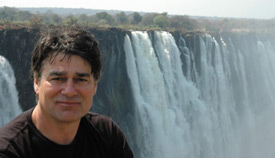 pushed down and down almost like geological strata until they become very potent. And then they come up as something new. Manifestations of them become highly creative. It’s what is happening inside of our selves. Sometimes they burst out and we cannot control them anymore even if we want to. http://www.davidwhyte.com/home.html
pushed down and down almost like geological strata until they become very potent. And then they come up as something new. Manifestations of them become highly creative. It’s what is happening inside of our selves. Sometimes they burst out and we cannot control them anymore even if we want to. http://www.davidwhyte.com/home.html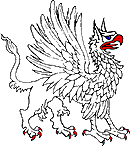 For example in mythology we have griffons and sphinxes and all kinds of animals that are incongruent. They don’t fit together right. And if you’re interpreting your dream and you are trying to get to the most meaningful part of the dream, look at the part that’s the oddest. You know, all those impossible things happen, so symbols, by being incongruent, can bring us right to the point where we are to direct our consciousness.
For example in mythology we have griffons and sphinxes and all kinds of animals that are incongruent. They don’t fit together right. And if you’re interpreting your dream and you are trying to get to the most meaningful part of the dream, look at the part that’s the oddest. You know, all those impossible things happen, so symbols, by being incongruent, can bring us right to the point where we are to direct our consciousness. 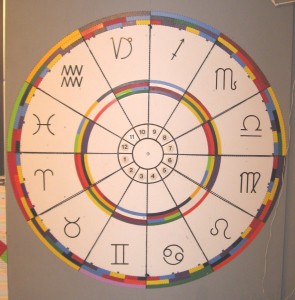 In it all of the constellations are lined up or called the signs, and all of the signs are lined up with all of the houses, and all of the planets are in their signs and houses of rulership, and the aspects are implicit within it. It is the ideal universe. Just about everything that is in the external universe is in the symbolic universe of the mandala, which means a lot of good thinking.
In it all of the constellations are lined up or called the signs, and all of the signs are lined up with all of the houses, and all of the planets are in their signs and houses of rulership, and the aspects are implicit within it. It is the ideal universe. Just about everything that is in the external universe is in the symbolic universe of the mandala, which means a lot of good thinking. 